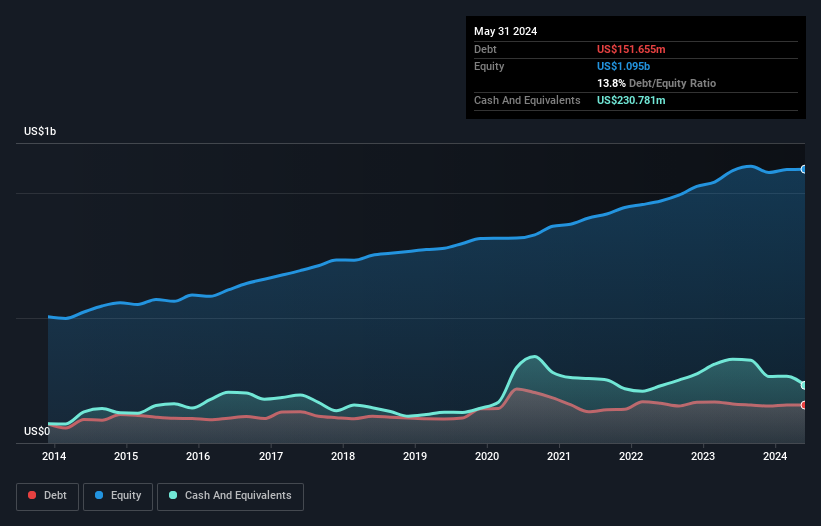- United States
- /
- Food and Staples Retail
- /
- NasdaqGS:PSMT
PriceSmart (NASDAQ:PSMT) Seems To Use Debt Quite Sensibly
Warren Buffett famously said, 'Volatility is far from synonymous with risk.' So it seems the smart money knows that debt - which is usually involved in bankruptcies - is a very important factor, when you assess how risky a company is. As with many other companies PriceSmart, Inc. (NASDAQ:PSMT) makes use of debt. But the real question is whether this debt is making the company risky.
When Is Debt A Problem?
Generally speaking, debt only becomes a real problem when a company can't easily pay it off, either by raising capital or with its own cash flow. In the worst case scenario, a company can go bankrupt if it cannot pay its creditors. However, a more frequent (but still costly) occurrence is where a company must issue shares at bargain-basement prices, permanently diluting shareholders, just to shore up its balance sheet. Of course, plenty of companies use debt to fund growth, without any negative consequences. The first step when considering a company's debt levels is to consider its cash and debt together.
View our latest analysis for PriceSmart
What Is PriceSmart's Net Debt?
As you can see below, PriceSmart had US$151.7m of debt, at May 2024, which is about the same as the year before. You can click the chart for greater detail. However, its balance sheet shows it holds US$230.8m in cash, so it actually has US$79.1m net cash.

A Look At PriceSmart's Liabilities
We can see from the most recent balance sheet that PriceSmart had liabilities of US$694.4m falling due within a year, and liabilities of US$231.0m due beyond that. Offsetting these obligations, it had cash of US$230.8m as well as receivables valued at US$43.0m due within 12 months. So it has liabilities totalling US$651.6m more than its cash and near-term receivables, combined.
This deficit isn't so bad because PriceSmart is worth US$2.76b, and thus could probably raise enough capital to shore up its balance sheet, if the need arose. However, it is still worthwhile taking a close look at its ability to pay off debt. Despite its noteworthy liabilities, PriceSmart boasts net cash, so it's fair to say it does not have a heavy debt load!
Fortunately, PriceSmart grew its EBIT by 9.1% in the last year, making that debt load look even more manageable. There's no doubt that we learn most about debt from the balance sheet. But ultimately the future profitability of the business will decide if PriceSmart can strengthen its balance sheet over time. So if you're focused on the future you can check out this free report showing analyst profit forecasts.
Finally, a company can only pay off debt with cold hard cash, not accounting profits. While PriceSmart has net cash on its balance sheet, it's still worth taking a look at its ability to convert earnings before interest and tax (EBIT) to free cash flow, to help us understand how quickly it is building (or eroding) that cash balance. In the last three years, PriceSmart's free cash flow amounted to 25% of its EBIT, less than we'd expect. That weak cash conversion makes it more difficult to handle indebtedness.
Summing Up
While PriceSmart does have more liabilities than liquid assets, it also has net cash of US$79.1m. On top of that, it increased its EBIT by 9.1% in the last twelve months. So we don't have any problem with PriceSmart's use of debt. We'd be motivated to research the stock further if we found out that PriceSmart insiders have bought shares recently. If you would too, then you're in luck, since today we're sharing our list of reported insider transactions for free.
At the end of the day, it's often better to focus on companies that are free from net debt. You can access our special list of such companies (all with a track record of profit growth). It's free.
New: Manage All Your Stock Portfolios in One Place
We've created the ultimate portfolio companion for stock investors, and it's free.
• Connect an unlimited number of Portfolios and see your total in one currency
• Be alerted to new Warning Signs or Risks via email or mobile
• Track the Fair Value of your stocks
Have feedback on this article? Concerned about the content? Get in touch with us directly. Alternatively, email editorial-team (at) simplywallst.com.
This article by Simply Wall St is general in nature. We provide commentary based on historical data and analyst forecasts only using an unbiased methodology and our articles are not intended to be financial advice. It does not constitute a recommendation to buy or sell any stock, and does not take account of your objectives, or your financial situation. We aim to bring you long-term focused analysis driven by fundamental data. Note that our analysis may not factor in the latest price-sensitive company announcements or qualitative material. Simply Wall St has no position in any stocks mentioned.
About NasdaqGS:PSMT
PriceSmart
Owns and operates U.S.-style membership shopping warehouse clubs in the United States, Central America, the Caribbean, and Colombia.
Flawless balance sheet with solid track record and pays a dividend.
Similar Companies
Market Insights
Community Narratives



